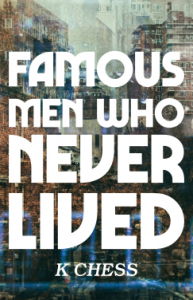Review: Famous Men Who Never Lived

Famous Men Who Never Lived is built upon a tremendous premise: survivors from a doomed alternate timeline, selected through lottery, flee through a portal into our world. They're registered, treated as refugees, and forced to endure stigmas they cannot shake and restrictions that deny them their freedom. Their presence draws parallels to the Book of Revelation (their number was relatively close to 144,000). Their knowledge of the world, their speech, their culture—all of these were left in another reality.
The premise is fabulous, but the implementation was off. There's so much potential here, but it's untapped. We're told that these two worlds had identical histories until the the first decade of the twentieth century. In the last 110 years, however, everything has changed. In this other timeline, South America is a super power, the United States uses the metric system, the swastika is a peaceful symbol of eternity, every posh neighborhood is a slum, every celebrity you've ever heard of never rose to fame. Nearly every piece of history since 1909 has been turned upside down. If it happened in your world in the last hundred years, it apparently didn't happen in theirs. You were never born, neither were your parents or their parents. And I find this not only hard to believe, but anticlimactic. Here's a chance to to tackle issues that could be fun to explore: What if you run into the parallel you? What if your child who died in the parallel timeline is alive in this one? What if some maniacal tyrant from the other timeline lives in peace in this one? None of this is explored. Instead, after such a brilliant setup, we're given a rather run-of-the-mill thriller that plays out like an episode of Scooby-Doo. (Those in the other timeline didn't have Scooby, however, so they may have thought they were being original.)
When Famous Men Who Never Lived focuses on the human side of the story, it's wonderful. Like when the protagonist is considering the son she left behind. Or the dichotomy of world that welcomes these refugees who have nowhere else to go, but binds them in yellow tape. Even the simple nostalgia for a world one can never return to. I would've loved a story like that. At some point, though, the action took over and a villain had to be constructed. I hate stories with villains—it's a constraint of our world that I find so incredibly limiting and boring. Maybe there's another reality out there where literature isn't littered with all these villains, and if so, I do hope some day to visit it.
If you like science-fiction-based mysteries with a plot that is too light for literary readers and too dense for thrill-seeking readers, this is the perfect novel for you!



